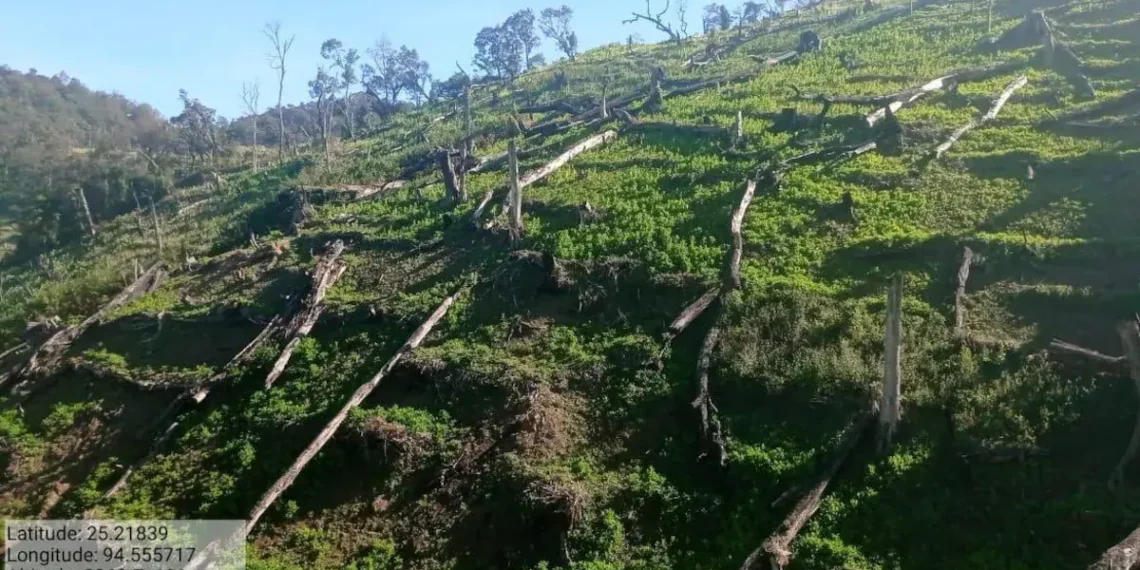In the strife-torn state of Manipur, poppy cultivation and drug abuse remain persistent challenges. Recent operations in Kamjong and Kangpokpi districts saw the destruction of over 59 acres of illegal poppy fields. Despite these efforts, activists argue that addressing the root causes of addiction is critical for lasting change.
PC Bureau
The strife-torn Manipur has been grappling with the dual challenges of illegal poppy cultivation and rampant drug abuse. The state government has intensified efforts to combat these issues, leading to significant actions against illicit activities.
Since 2017, the Manipur government has undertaken substantial operations to eradicate illegal poppy cultivation. As of December 2024, authorities have destroyed around 20,000 acres of poppy fields across 12 districts. Notably, in December 2024 alone, approximately 150 acres of illegal poppy cultivation were eradicated in the Mapithel hill range of Kamjong district, and 14 acres in Kangpokpi district.
Extent of the Drug Menace
The proliferation of poppy cultivation has exacerbated drug abuse in Manipur. A 2019 report by the Ministry of Social Justice and Empowerment highlighted that 4% of individuals aged 10-75 in Manipur use opioids, ranking it fifth highest in India.
The state shares a border with Myanmar, a region known for significant heroin production, facilitating the influx of narcotics.
Despite the government’s efforts, challenges persist. Activists argue that the “War on Drugs” should address the scale of drug addiction in Manipur. They emphasize that poppy cultivation is only one aspect of the issue, and comprehensive strategies are needed to tackle drug abuse effectively.
Poppy cultivation in Manipur has been a significant concern due to its link to the production of heroin and other opioids. While the state government claims to have destroyed thousands of acres of poppy plantations since 2017, the problem persists, with satellite imagery revealing a substantial area under cultivation in recent years.
Recent Crackdown Efforts
The state government has intensified its efforts to curb poppy cultivation, leading to numerous instances of destruction of poppy fields by police and security forces. These operations have often resulted in arrests and the filing of FIRs against those involved in the illegal activity.
Recent Cases of Poppy Cultivation Destruction
- December 14, 2024: 14 acres of poppy plantation destroyed in Kangpokpi district.
- December 12, 2024: An FIR filed after the destruction of 14 acres of poppy fields in Kangpokpi district.
- December 7, 2024: 30 acres of illegal poppy cultivation destroyed in Ukhrul district, leading to the arrest of four individuals.
- December 5, 2024: 8.6 acres of poppy fields destroyed in Senapati district.
- December 5, 2024: 45 acres of poppy cultivation destroyed in Kamjong district, resulting in the arrest of two individuals.
The fight against poppy cultivation in Manipur is a complex and ongoing challenge. A comprehensive and sustained effort involving the government, security forces, and local communities is crucial to achieve lasting success.
Despite the ongoing crackdown, several challenges remain in the fight against poppy cultivation in Manipur. These include:
- Limited alternative livelihoods: Many farmers in the region rely on poppy cultivation as a source of income due to limited access to alternative livelihood options.
- Cross-border smuggling: The porous border with Myanmar facilitates the smuggling of poppy seeds and finished products, making it difficult to control the supply chain.
- Limited resources: The state government faces resource constraints in effectively monitoring and eradicating poppy cultivation across vast and remote areas.
To effectively address these challenges, a multi-pronged approach is necessary. This includes:
- Providing alternative livelihoods: The government must invest in programs that offer farmers viable alternatives to poppy cultivation, such as agroforestry, horticulture, and livestock rearing.
- Strengthening border security: Enhanced border security measures are crucial to prevent the cross-border smuggling of poppy seeds and finished products.
- Community engagement: Involving local communities in the fight against poppy cultivation is essential for sustainable success. Community-based rehabilitation programs can help address the social and economic factors that drive people towards poppy cultivation.














